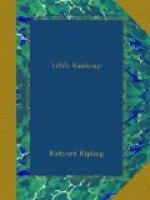Four men, each entitled to ’life, liberty, and the pursuit of happiness,’ sat at a table playing whist. The thermometer marked—for them—one hundred and one degrees of heat. The room was darkened till it was only just possible to distinguish the pips of the cards and the very white faces of the players. A tattered, rotten punkah of whitewashed calico was puddling the hot air and whining dolefully at each stroke. Outside lay gloom of a November day in London. There was neither sky, sun, nor horizon,—nothing but a brown purple haze of heat. It was as though the earth were dying of apoplexy.
From time to time clouds of tawny dust rose from the ground without wind or warning, flung themselves tablecloth-wise among the tops of the parched trees, and came down again. Then a whirling dust-devil would scutter across the plain for a couple of miles, break, and fall outward, though there was nothing to check its flight save a long low line of piled railway-sleepers white with the dust, a cluster of huts made of mud, condemned rails, and canvas, and the one squat four-roomed bungalow that belonged to the assistant engineer in charge of a section of the Gaudhari State line then under construction.
The four, stripped to the thinnest of sleeping-suits, played whist crossly, with wranglings as to leads and returns. It was not the best kind of whist, but they had taken some trouble to arrive at it. Mottram of the Indian Survey had ridden thirty and railed one hundred miles from his lonely post in the desert since the night before; Lowndes of the Civil Service, on special duty in the political department, had come as far to escape for an instant the miserable intrigues of an impoverished native State whose king alternately fawned and blustered for more money from the pitiful revenues contributed by hard-wrung peasants and despairing camel-breeders; Spurstow, the doctor of the line, had left a cholera-stricken camp of coolies to look after itself for forty-eight hours while he associated with white men once more. Hummil, the assistant engineer, was the host. He stood fast and received his friends thus every Sunday if they could come in. When one of them failed to appear, he would send a telegram to his last address, in order that he might know whether the defaulter were dead or alive. There are very many places in the East where it is not good or kind to let your acquaintances drop out of sight even for one short week.
The players were not conscious of any special regard for each other. They squabbled whenever they met; but they ardently desired to meet, as men without water desire to drink. They were lonely folk who understood the dread meaning of loneliness. They were all under thirty years of age,—which is too soon for any man to possess that knowledge.
‘Pilsener?’ said Spurstow, after the second rubber, mopping his forehead.
’Beer’s out, I’m sorry to say, and there’s hardly enough soda-water for to-night,’ said Hummil.




